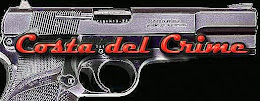Never Get Busted Again, Never Get Raided teaches viewers how to buy, sell and grow pot without going to jail.
Barry Cooper a fast-talking former narcotics cop, is best known for changing sides in the war on drugs in December 2006, when he released Never Get Busted Again. In the DVD, he offered marijuana users advice on how to avoid arrest during traffic stops.Police greeted the movie with sarcasm, but no real concern.
Now Cooper has begun shipping a new title, Never Get Raided, which teaches viewers how to buy, sell and grow pot without going to jail. He also gives tips for identifying undercover officers."Now that's getting a little close to home," said Richard Dickson, who served with Cooper on the West Texas Permian Basin Drug Task Force in the 1990s. "That kind of information affects all kinds of undercover agents. It puts all kinds of operations at risk, even on homeland security issues."
Cooper, who has filed as a Libertarian candidate in the 31st Congressional District in Central Texas, seems to have a talent for flaming the fuzz. Even so, his former colleagues concede he was a star narcotics officer.In eight years, Cooper claims to have taken part in 800 drug busts, 300 of them felonies, and seized more than $500,000 in cash. Photos tell some of the story.In one, with a buzz cut and overgrown mustache, he kneels next to a head-high heap of weed. The photo is marked, "230lbs." In another, a young Cooper stands thumbs-up by PVC pipes stuffed with marijuana and a thick stack of $100 bills. A sign reads: Permian Basin Drug Task Force."He was very good, no doubt," said Dickson, who now works as an investigator for the district attorney's office in Yoakum County, about 50 miles southwest of Lubbock. "Barry always liked to have his picture made with all the dope, even if somebody else knocked down a load. I remember him commenting one time, 'Twenty years from now I'll tell my grandkids I got all this.'"Cooper's former boss, Tom Finley, once called his protege the best drug interdiction officer in Texas, and perhaps the nation. Now a private investigator in Midland, he is more circumspect."He was one of the best we had, but we didn't have but two or three," Finley said last week. "Evidently things have changed a lot since then. He's just trying to make some more money."Cooper turned in his badge and grew his hair long about 10 years ago, after souring on U.S. drug laws and being investigated by the Drug Enforcement Agency for smuggling drugs out of Mexico.
He said he confronted DEA agents about the case."Let me tell you the drugs I smuggled from Mexico," he recalled telling an investigator. "The same drugs everybody smuggles from Mexico - the same ones your informant and my ex-wife smuggled from Mexico - they're called Valiums, and those little green pills that make you speed. Everyone grabs a box of those."
He was never charged with a drug crime. But over the years he has been arrested for allegedly making terroristic threats after a yelling match with a woman in a bar in Big Sandy, Texas. He pleaded guilty to making a verbal threat in that misdemeanor case. He filed for but did not complete Chapter 13 bankruptcy in 1995."The last three months of my law enforcement career, I had started smoking pot," he said recently, sitting at his kitchen table in Big Sandy, a small town east of Tyler. "And I noticed the people I had been arresting were nice people. They had a balanced checkbook, their kids made straight A's, and I was like, 'This drug is not making people crazy.'"He advocates the legalization of all drugs. If the laws changed, he said, addicts would receive better treatment, drug-fueled crime would plummet and illegal drug empires would collapse.It is similar to an argument advanced by Law Enforcement Against Prohibition, an organization of 10,000 members including former judges, prosecutors, federal agents and police officers that opposes the war on drugs."We don't agree philosophically at all on these issues," said Jack Cole, executive director and a 14-year undercover officer for the New Jersey State Police. "He thinks he should be able to school people on how to break the law; we believe in changing the law."Drug laws will be broken, whether or not the law is changed, Cooper said. He's simply trying to help people avoid jail time for non-violent crime:"Americans are not going to stop growing it, they're not going to stop buying it, they're not going to stop smoking it, even if you continue to put them in jail."He said the discovery of seven fields and more than 25,000 plants near Dallas last summer illustrates his point.
Dallas Police Department Deputy Chief Julian Bernal doesn't dispute the public's appetite for marijuana, but he condemned Cooper's tactics."I think it's unconscionable for an ex-law enforcement officer to give tips to criminals. I don't think there's any question he's putting officers in danger, and he bears full responsibility for that."
Now Cooper has begun shipping a new title, Never Get Raided, which teaches viewers how to buy, sell and grow pot without going to jail. He also gives tips for identifying undercover officers."Now that's getting a little close to home," said Richard Dickson, who served with Cooper on the West Texas Permian Basin Drug Task Force in the 1990s. "That kind of information affects all kinds of undercover agents. It puts all kinds of operations at risk, even on homeland security issues."
Cooper, who has filed as a Libertarian candidate in the 31st Congressional District in Central Texas, seems to have a talent for flaming the fuzz. Even so, his former colleagues concede he was a star narcotics officer.In eight years, Cooper claims to have taken part in 800 drug busts, 300 of them felonies, and seized more than $500,000 in cash. Photos tell some of the story.In one, with a buzz cut and overgrown mustache, he kneels next to a head-high heap of weed. The photo is marked, "230lbs." In another, a young Cooper stands thumbs-up by PVC pipes stuffed with marijuana and a thick stack of $100 bills. A sign reads: Permian Basin Drug Task Force."He was very good, no doubt," said Dickson, who now works as an investigator for the district attorney's office in Yoakum County, about 50 miles southwest of Lubbock. "Barry always liked to have his picture made with all the dope, even if somebody else knocked down a load. I remember him commenting one time, 'Twenty years from now I'll tell my grandkids I got all this.'"Cooper's former boss, Tom Finley, once called his protege the best drug interdiction officer in Texas, and perhaps the nation. Now a private investigator in Midland, he is more circumspect."He was one of the best we had, but we didn't have but two or three," Finley said last week. "Evidently things have changed a lot since then. He's just trying to make some more money."Cooper turned in his badge and grew his hair long about 10 years ago, after souring on U.S. drug laws and being investigated by the Drug Enforcement Agency for smuggling drugs out of Mexico.
He said he confronted DEA agents about the case."Let me tell you the drugs I smuggled from Mexico," he recalled telling an investigator. "The same drugs everybody smuggles from Mexico - the same ones your informant and my ex-wife smuggled from Mexico - they're called Valiums, and those little green pills that make you speed. Everyone grabs a box of those."
He was never charged with a drug crime. But over the years he has been arrested for allegedly making terroristic threats after a yelling match with a woman in a bar in Big Sandy, Texas. He pleaded guilty to making a verbal threat in that misdemeanor case. He filed for but did not complete Chapter 13 bankruptcy in 1995."The last three months of my law enforcement career, I had started smoking pot," he said recently, sitting at his kitchen table in Big Sandy, a small town east of Tyler. "And I noticed the people I had been arresting were nice people. They had a balanced checkbook, their kids made straight A's, and I was like, 'This drug is not making people crazy.'"He advocates the legalization of all drugs. If the laws changed, he said, addicts would receive better treatment, drug-fueled crime would plummet and illegal drug empires would collapse.It is similar to an argument advanced by Law Enforcement Against Prohibition, an organization of 10,000 members including former judges, prosecutors, federal agents and police officers that opposes the war on drugs."We don't agree philosophically at all on these issues," said Jack Cole, executive director and a 14-year undercover officer for the New Jersey State Police. "He thinks he should be able to school people on how to break the law; we believe in changing the law."Drug laws will be broken, whether or not the law is changed, Cooper said. He's simply trying to help people avoid jail time for non-violent crime:"Americans are not going to stop growing it, they're not going to stop buying it, they're not going to stop smoking it, even if you continue to put them in jail."He said the discovery of seven fields and more than 25,000 plants near Dallas last summer illustrates his point.
Dallas Police Department Deputy Chief Julian Bernal doesn't dispute the public's appetite for marijuana, but he condemned Cooper's tactics."I think it's unconscionable for an ex-law enforcement officer to give tips to criminals. I don't think there's any question he's putting officers in danger, and he bears full responsibility for that."









0 Response to "Never Get Busted Again, Never Get Raided teaches viewers how to buy, sell and grow pot without going to jail."
Post a Comment
Note: only a member of this blog may post a comment.